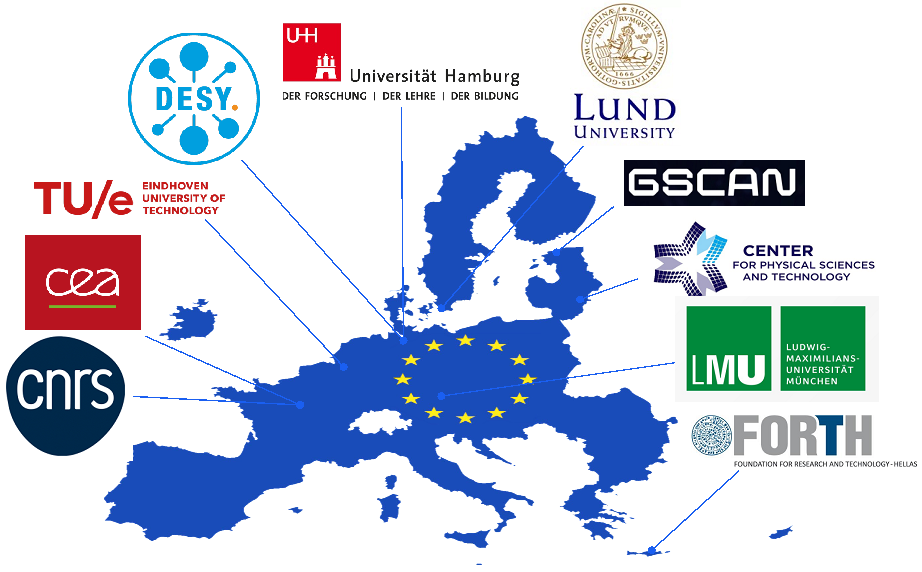Launch of Doctoral Network EPACE Focusing on Compact Accelerators and Innovation
With 32 academic and industrial partners, the program led by DESY receives 4 million euros of funding from Marie Skłodowska-Curie Actions to support 15 PhD projects and act as an accelerator for the European innovation ecosystem. The application portal will open on April 1.
The EPACE (European Compact Accelerators, Their Applications, and Entrepreneurship) doctoral network has secured funding from the prestigious Marie Skłodowska-Curie Actions, the EU’s leading program for supporting doctoral education and postdoctoral research training. Officially launched on January 1st, 2025, EPACE aims to train the next generation of scientists in compact accelerator technologies while exploring their applications and commercial potential. The consortium is coordinated by Maxence Thévenet, team leader for theory and simulation in DESY’s plasma acceleration group. It comprises nine academic institutions and one private company across seven EU countries, alongside 22 associated partners worldwide.
With recent advancements in novel compact accelerators, particularly plasma accelerators and laser-driven X-ray sources, these technologies are now reaching maturity. This makes it an ideal moment to expand their application across academia, medicine, security, and industry. At the crossroads of disciplines such as high-intensity laser science, high-performance computing, plasma and accelerator physics (both theoretical and experimental), and artificial intelligence, these innovative systems have the potential to significantly reduce the cost and size of accelerators. This could unlock new opportunities across various scientific domains. EPACE takes this progress further by integrating a strong entrepreneurship component, designed to facilitate technology transfer and meet the growing demand for experts in these fields. The program will actively collaborate with industry, combining research and development efforts to unveil the commercial potential of compact accelerator technology.
This four-year initiative will support 15 PhD projects focused on pioneering research within the consortium. Participants will receive extensive training, including secondments at partner institutions and companies, network-wide events, and specialized summer schools covering topics such as accelerator science, plasma physics, high-performance computing, photon science, and radiotherapy. Additionally, students will develop transferable skills through courses on scientific communication, writing, and presentation techniques. Complementing this, EPACE will provide entrepreneurship training through the prestigious HEC Paris (École des Hautes Études Commerciales de Paris), equipping researchers with the tools to identify commercial opportunities in compact accelerator technology and evaluate their feasibility.
Maxence Thévenet, team leader at DESY and scientific coordinator of the network, points out: “Our goal is to equip the next generation of physicists with the skills and knowledge to drive scientific breakthroughs in compact accelerator technologies and translate them into applications within industry or healthcare, fostering a vibrant ecosystem of innovation in Europe.”
As Marc Vanhuele, Professor of Marketing at HEC, indicates: “We are proud to have been chosen by DESY to provide a customized version of our successful online certificates and MSc program in innovation and entrepreneurship. After having trained more than 900 entrepreneurial minds with the most diverse backgrounds in this program, offering a tailor-made version for a specific public is a first for us. We are looking forward to helping the EPACE participants come up with promising ideas, turn them into start-up projects that they ultimately can accelerate to full scale.”
Wim Leemans, Director of the Accelerator Division at DESY, enthusiastically states: “We are thrilled to coordinate a Marie Skłodowska-Curie Doctoral Network at DESY for the first time, working with our local and European partners. EPACE will equip young scientists with the skills to drive the development of plasma accelerators and thus make this exciting new technology not only more widely accessible, but reducing their costs as well.”
Applications will be accepted from April 2025, for a starting date of the PhD candidates by September 2025. Besides standard conditions, applicants must satisfy the Marie Skłodowska-Curie mobility rule, more details can be found on the EU website. Each PhD project is funded for a duration of three years. More information and applications on https://epace.eu.
For interested applicants, a Q&A session will be offered on April, 10, 11am, please register under: lisa.crinon@desy.de
The EPACE Consortium
• Deutsches Elektronen-Synchrotron DESY https://www.desy.de
• The French Alternative Energies and Atomic Energy Commission CEA https://www.cea.fr/english
• The Foundation for Research and Technology - Hellas FORTH https://www.forth.gr/en/home/
• The Center for Physical Sciences and Technology FTMC https://www.ftmc.lt/en
• Ludwig-Maximilians-Universität München LMU https://www.lmu.de/en/about-lmu/
• The National Centre for Scientific Research CNRS https://www.cnrs.fr/en
• Eindhoven University of Technology TU/e https://www.tue.nl/en/
• Universität Hamburg UHH https://www.uni-hamburg.de/en.html
• Lund University ULUND https://www.lunduniversity.lu.se/
• GScan OÜ https://www.gscan.eu
published
- 2025/03/28
Press Contact
- innovation@desy.de


